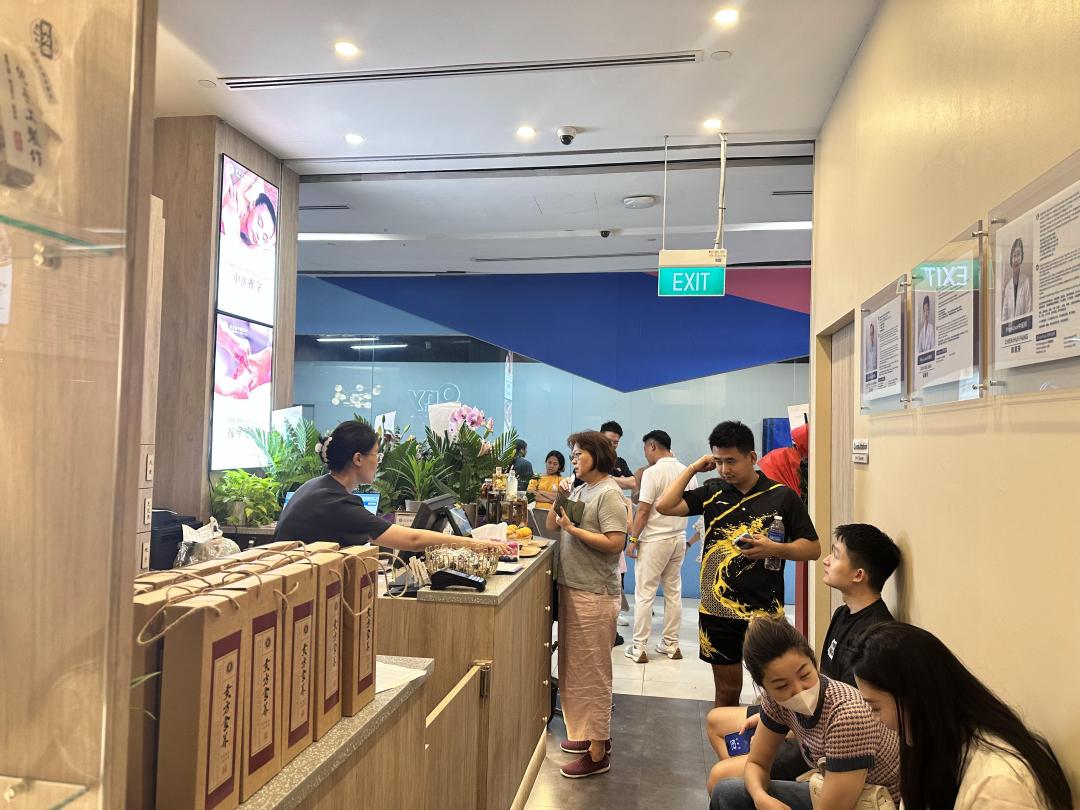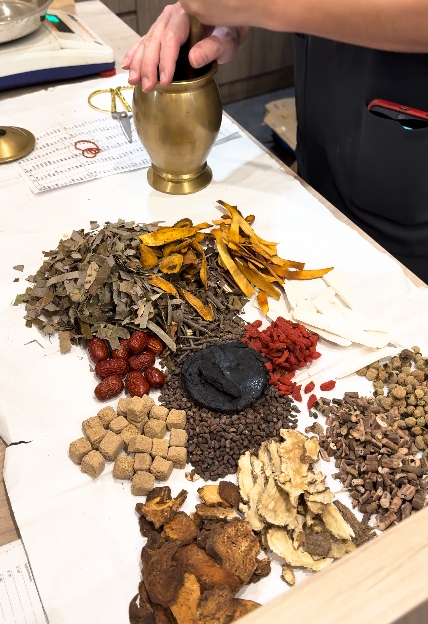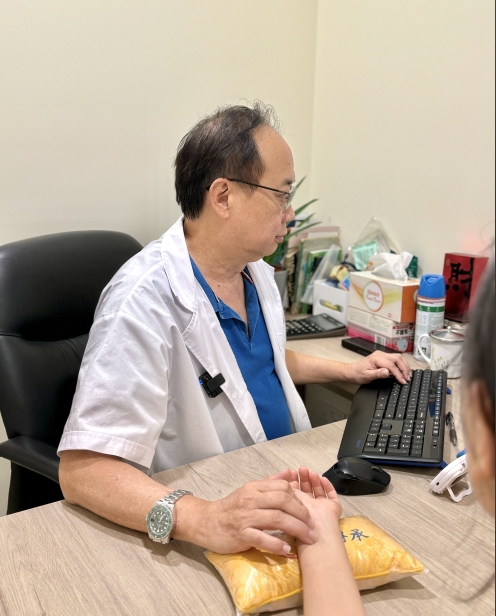- Physicians
- Clinics
- TCM
- Western GP
-
Fees
-
Deals & Privileges
- About & Resources
- Contact Us
Many women suffer from excessive menstrual bleeding, characterized by irregular cycles, heavy flow, fatigue, dizziness, and even impacts on daily life and health. Blindly taking tonics or neglecting the issue can be counterproductive. How does Traditional Chinese Medicine (TCM) effectively regulate this?

What causes excessive menstrual bleeding?
According to Dr. Que Poh Yuen Albert, a TCM gynecology expert at Singapore Gong Fang Tang TCM, excessive menstrual bleeding is termed "Beng Lou" (abnormal uterine bleeding) in TCM. Menstrual flow significantly exceeding 80ml (requiring pad/tampon changes every 1-2 hours with frequent overflow, or presence of large clots), or a period lasting over 7 days, is considered abnormal. Common causes among Singaporean women include:
Spleen Deficiency Failing to Contain Blood: Singapore's varied dietary habits and high work stress easily damage the spleen and stomach. Spleen Qi deficiency leads to an inability to contain blood, resulting in heavy, pale, thin menstrual flow, often accompanied by shortness of breath, fatigue, and sallow complexion.
Kidney Qi Deficiency: The Kidneys govern storage. Congenital weakness, excessive sexual activity/multiple childbirths, or chronic illness damaging the Kidneys can cause Kidney Qi instability, failing to control menstrual blood. This manifests as heavy flow or prolonged spotting, accompanied by sore lower back/weak knees, dizziness, and tinnitus.
Blood Heat Disturbance: The local hot and humid climate, combined with spicy diets, staying up late, and emotional anxiety (Liver Qi stagnation transforming into fire), easily generates internal heat. This heat forces blood to move recklessly, leading to heavy flow, bright red or deep red color, thick consistency with clots, irritability, thirst, and dry stools.
Blood Stasis Obstruction: Cold congealing (excessive consumption of cold drinks/foods, overly air-conditioned environments), Qi stagnation, or surgical trauma can cause blood stasis in the uterus. Stasis obstructs, preventing new blood from returning to its proper channels and causing it to spill out. Common signs include heavy flow, purplish-dark color, large and numerous clots, and stabbing lower abdominal pain worsened by pressure.
Modern Factors: Uterine fibroids, endometrial polyps, adenomyosis, endocrine disorders (e.g., luteal phase defect), coagulation disorders, and intrauterine devices (IUDs) also need to be ruled out through professional examination.
Dr. Que reminds: Long-term excessive menstrual bleeding can easily lead to anemia (dizziness, palpitations, pale complexion), decreased immunity, and even affect fertility. It is essential to seek medical attention promptly to identify the cause. Integrated Chinese and Western medicine treatment yields better results.

How does TCM regulate excessive menstrual bleeding?
For excessive menstrual bleeding of the Deficiency-Cold with Blood Stasis type (clinically common), Dr. Que Poh Yuen Albertparticularly advocates and skillfully uses the classical formula from the Sage of Medicine, Zhang Zhongjing – Wen Jing Tang (Channel-Warming Decoction). This formula is a classic for regulating menstruation in gynecology and effectively addresses many menstrual issues!
Wen Jing Tang Composition: Evodia Fruit (Wu Zhu Yu), Ophiopogon Root (Mai Dong), Chinese Angelica Root (Dang Gui), White Peony Root (Bai Shao), Sichuan Lovage Root (Chuan Xiong), Ginseng (Ren Shen), Cinnamon Twig (Gui Zhi), Donkey-Hide Gelatin (E Jiao), Tree Peony Bark (Mu Dan Pi), Fresh Ginger (Sheng Jiang), Licorice Root (Gan Cao), Pinellia Tuber (Ban Xia).
Indications: Deficiency-Cold in the Chong and Ren Meridians with Blood Stasis. Symptoms include delayed menstruation or excessive flow, dull color with clots, cold pain in the lower abdomen relieved by warmth/pressure, cold hands and feet, dry lips and mouth (upper body heat, lower body cold), long-term infertility, etc.
What is remarkable about Wen Jing Tang?
Warms Channels & Dispels Cold: Evodia Fruit, Cinnamon Twig, and Fresh Ginger warm and unblock the channels, dispelling cold pathogens from the uterus.
Nourishes Blood & Dispels Stasis: Chinese Angelica, Sichuan Lovage, and White Peony nourish blood and activate circulation; Tree Peony Bark clears heat congested in the blood level and aids in dispelling stasis.
Tonifies Qi, Strengthens Spleen & Harmonizes Stomach: Ginseng, Licorice, and Ophiopogon Root tonify Qi and nourish Yin to promote fluid production; Pinellia and Fresh Ginger harmonize the stomach and direct rebellious Qi downward, preventing the tonic herbs from causing stagnation.
Regulates the Chong & Ren Meridians: The formula collectively warms the channels, dispels cold, nourishes blood, dispels stasis, and regulates the Chong and Ren Meridians. This allows blood to move smoothly with warmth, removes stasis to generate new blood, guides blood back to its normal pathways, and naturally regulates menstrual flow.
Dr. Que's Clinical Insights:
Wen Jing Tang is not simply a blood-staunching medicine. It focuses on harmonization – warming and unblocking blood vessels to dispel cold and stasis, nourishing Yin blood to replenish deficiency. This restores harmony to the Qi and blood of the uterus and strengthens the Chong and Ren Meridians' ability to contain, achieving the goal of treating both the root cause and the symptoms to stop bleeding and regulate menstruation.
"In Singapore, women often develop an 'upper body heat, lower body cold' constitution due to cold consumption, stress, and air-conditioned environments. Wen Jing Tang's formula composition aligns very well. The key lies in precise syndrome differentiation and modification based on presentation. If Qi deficiency is prominent, increase Ginseng and add Astragalus (Huang Qi); if blood heat is obvious, reduce the warm/acrid herbs and add Rehmannia (Sheng Di Huang) and Scutellaria (Huang Qin); if stasis is severe, add Peach Kernel (Tao Ren) and Safflower (Hong Hua), etc."

Medical Case
Patient: Ms. Lin, 32 years old.
Chief Complaint: Significantly increased menstrual flow over the past year, periods lasting 7-10 days, flow heavy like flooding (requiring overnight pad changes hourly for the first 3 days), dark red color with large, numerous blood clots as large as pigeon eggs. Experienced cold pain in the lower abdomen, relieved by warmth. Accompanied by severe fatigue, dizziness, aversion to cold, cold limbs, and pale complexion. Western medical examinations ruled out organic lesions; diagnosed as "dysfunctional uterine bleeding." Hormonal treatment was ineffective with significant side effects.
First Visit: Pale-dark tongue with stasis spots on the edges, thin white coating. Pulse: deep, thready, and choppy.
Syndrome Differentiation: Deficiency-Cold in Chong and Ren Meridians, internal obstruction of blood stasis, complicated by Qi and Blood deficiency.
Treatment Principle: Warm the channels and dispel cold, dispel stasis and stop bleeding, tonify Qi and nourish blood.
Prescription: Modified Wen Jing Tang.
Ingredients: Evodia Fruit (Wu Zhu Yu) 6g, Chinese Angelica Root (Dang Gui) 12g, Sichuan Lovage Root (Chuan Xiong) 9g, White Peony Root (Bai Shao) 15g, Codonopsis Root (Dang Shen, substitute for Ren Shen) 20g, Cinnamon Twig (Gui Zhi) 9g, Gelatin Granules (E Jiao Zhu, melted) 10g, Tree Peony Bark (Mu Dan Pi) 9g, Fresh Ginger (Sheng Jiang) 6g, Prepared Licorice Root (Zhi Gan Cao) 6g, Charred Argy Wormwood Leaf (Ai Ye Tan) 10g (warms channels, stops bleeding), Hairyvein Agrimonia Herb (Xian He Cao) 30g (astringes to stop bleeding, tonifies deficiency), Astragalus Root (Huang Qi) 20g (tonifies Qi to contain blood).
Administration: Start taking one week before expected period, one dose daily for 7-10 days. Continue taking during menstruation if flow is heavy. After bleeding stops, adjust the formula to focus on regulating and tonifying Qi and Blood.
Result: After the first month of medication, the menstrual period shortened to 8 days, bleeding volume reduced by about 30%, clots became smaller, abdominal pain lessened, and fatigue slightly eased. In the second month (with slight formula adjustments based on presentation), the period lasted 7 days, flow volume approached normal range (reduced by over 50%), only occasional small clots, mild abdominal pain, with significant improvement in energy and physical strength, and complexion becoming rosier. By the third month, the menstrual cycle was regular, flow volume moderate, lasting 5-6 days without large clots, abdominal pain disappeared, and aversion to cold and fatigue significantly improved. Subsequent treatment focused on consolidating with formulas to fortify the Spleen, tonify the Kidneys, and harmonize Qi and Blood. Follow-up after half a year showed no recurrence, and anemia indicators returned to normal.
